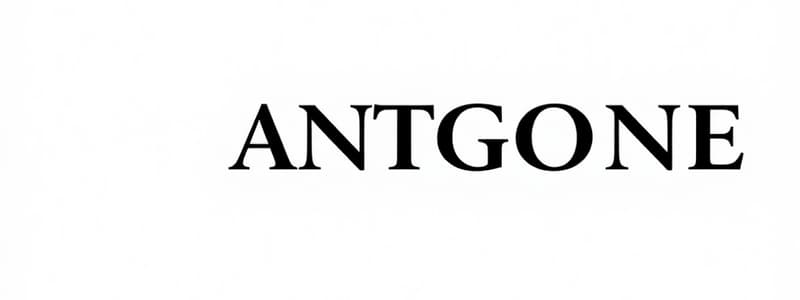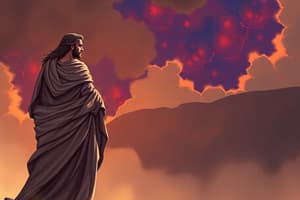Podcast
Questions and Answers
Quel est le point central du conflit entre Antigone et Créon ?
Quel est le point central du conflit entre Antigone et Créon ?
- La liberté individuelle
- Le devoir envers la famille et la loi de l'État (correct)
- Le droit d'asile
- La justice sociale
Quel est le rôle de Tirésias dans la pièce ?
Quel est le rôle de Tirésias dans la pièce ?
- Un personnage comique qui allège l'atmosphère
- Un voyant qui met en garde Créon sur les conséquences de ses actes (correct)
- Un personnage symbolique représentant la raison
- Un ami d'Antigone qui soutient son choix
Quel est le message principal de Antigone ?
Quel est le message principal de Antigone ?
- La victoire du bien sur le mal
- La nécessité de se conformer à la loi
- Le conflit entre le devoir et la loi, et la force de la conscience individuelle (correct)
- L'importance de l'amour et de la famille
Quel est le rôle d'Ismène dans le conflit ?
Quel est le rôle d'Ismène dans le conflit ?
Comment la pièce utilise-t-elle le symbolisme ?
Comment la pièce utilise-t-elle le symbolisme ?
Quel est l'effet de l'intransigeance de Créon sur la pièce ?
Quel est l'effet de l'intransigeance de Créon sur la pièce ?
Quel est le rôle du conflit familial dans la pièce ?
Quel est le rôle du conflit familial dans la pièce ?
Quel est le message profond que Sophocle veut transmettre à travers la pièce ?
Quel est le message profond que Sophocle veut transmettre à travers la pièce ?
Quel est l'élément central de la tragédie d'Antigone qui remet en question le pouvoir absolu et la rigidité ?
Quel est l'élément central de la tragédie d'Antigone qui remet en question le pouvoir absolu et la rigidité ?
Quel rôle joue Tirésias dans la pièce et quel est son impact sur l'intrigue ?
Quel rôle joue Tirésias dans la pièce et quel est son impact sur l'intrigue ?
En quoi l'ironie dramatique contribue-t-elle à la tension et au caractère tragique de la pièce ?
En quoi l'ironie dramatique contribue-t-elle à la tension et au caractère tragique de la pièce ?
Quel est l'un des thèmes centraux explorés dans la pièce d'Antigone par Sophocle ?
Quel est l'un des thèmes centraux explorés dans la pièce d'Antigone par Sophocle ?
Quel est le principal message de la pièce d'Antigone de Sophocle pour les lecteurs d'aujourd'hui ?
Quel est le principal message de la pièce d'Antigone de Sophocle pour les lecteurs d'aujourd'hui ?
Flashcards
Pouvoir et Autorité
Pouvoir et Autorité
La position de Créon en tant que roi est remise en question en raison de son inflexibilité.
Destin et Prophétie
Destin et Prophétie
Tirésias communique l'intervention divine, soulignant le rôle du destin dans l'histoire.
Ironie Dramatiques
Ironie Dramatiques
L'ironie dramatique accroît la tension et la tragédie des actions d'Antigone.
Motivations des Personnages
Motivations des Personnages
Signup and view all the flashcards
Questions Morales
Questions Morales
Signup and view all the flashcards
Antigone
Antigone
Signup and view all the flashcards
Créon
Créon
Signup and view all the flashcards
Haemon
Haemon
Signup and view all the flashcards
Tiresias
Tiresias
Signup and view all the flashcards
Devoir vs Loi
Devoir vs Loi
Signup and view all the flashcards
Conscience individuelle
Conscience individuelle
Signup and view all the flashcards
Conséquences des actions
Conséquences des actions
Signup and view all the flashcards
Famille et relations
Famille et relations
Signup and view all the flashcards
Study Notes
General Overview
- Antigone is a Greek tragedy, and also a play by Sophocles.
- The play centers on a conflict between moral obligation and the state's laws.
Characters
- Antigone: A young woman who buries her brother, Polynices, despite a decree forbidding it. She is a strong, principled character.
- Creon: The King of Thebes, who decrees that Polynices's body should not be buried. He represents the law.
- Haemon: Creon's son, engaged to Antigone and opposing his father's decree.
- Ismene: Antigone's sister, who initially expresses reluctance to support Antigone, highlighting divergent perspectives of duty and personal conviction.
- Tiresias: A blind prophet who warns Creon of the consequences of his actions.
Plot Synopsis
- Thebes is torn by a civil war. Polynices, having fought against Thebes, is condemned to be unburied according to Creon's decree.
- Antigone, guided by her personal moral compass, believes that burying her brother is a required duty to the gods and dead. She goes against the law and buries him.
- Creon responds by imposing harsh penalties.
- The conflict escalates as family members become involved, showcasing deep-seated societal and personal tensions.
- Antigone's actions and the consequences highlight the importance of individual conscience, the conflict between personal and political morality, and the potential damage of inflexibility in upholding the law.
- Tiresias warns Creon of the consequences of his actions, which Creon initially dismisses.
Key Themes
- Duty vs. Law: The play powerfully explores the conflict between an individual's personal moral obligations (e.g. familial, religious) and the laws of the state. Antigone embodies duty to higher power, while Creon represents the authority of the state.
- Individual Conscience: Antigone demonstrates the strength of her individual conscience, choosing to follow her beliefs even if it means defying the law.
- Consequences of Actions: The characters experience profound consequences due to their choices, highlighting the importance of careful consideration of actions and their repercussions.
- Family and Relationships: The play touches upon familial love and duty, illustrating conflicts within family dynamics triggered by opposing moral positions. The suffering and turmoil experienced by Haemon and Antigone's sister reflect the personal impact of the conflict.
- Power and Authority: Creon's position as King is put under scrutiny due to his inflexibility, ultimately leading to tragic repercussions. The play questions how absolute power can be exerted in response to adversity and the toll it can take on those invested in upholding the law.
- Fate and Prophecy: Tiresias acts as a crucial figure communicating divine intervention, emphasizing fate's role in the narrative and the potential for premonition.
Style and Literary Significance
- Sophocles's use of dramatic irony effectively heightens the tension and the tragic quality of Antigone's actions.
- The dialogue creates compelling characters and explores their motivations.
- The play's enduring appeal lies in its timeless exploration of fundamental moral dilemmas.
- The work acts as a potent statement on the human condition, posing complex questions about morality, duty, and the nature of societal governance.
Studying That Suits You
Use AI to generate personalized quizzes and flashcards to suit your learning preferences.




